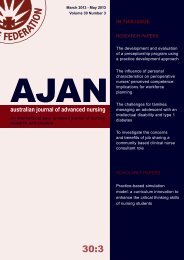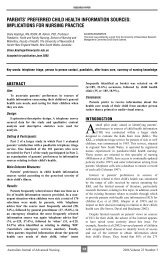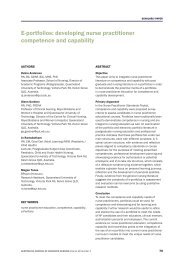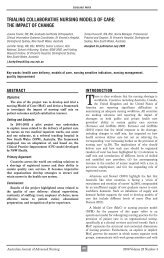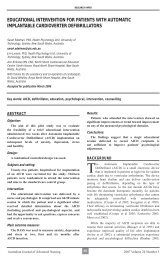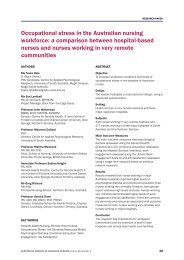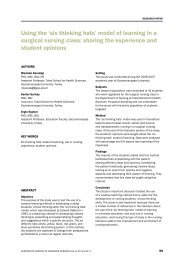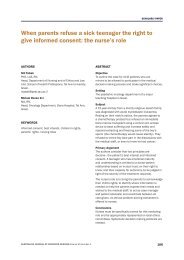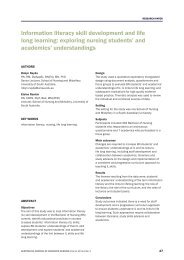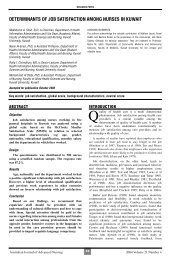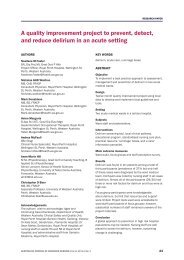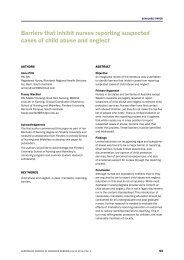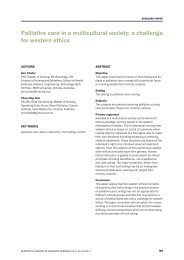Download Complete Issue - Australian Journal of Advanced Nursing
Download Complete Issue - Australian Journal of Advanced Nursing
Download Complete Issue - Australian Journal of Advanced Nursing
You also want an ePaper? Increase the reach of your titles
YUMPU automatically turns print PDFs into web optimized ePapers that Google loves.
RESEARCH PAPER<br />
Rethinking student night duty placements ‐ a<br />
replication study<br />
AUTHORS<br />
Dr Valerie Zielinski<br />
PhD, M.Ed Admin, B.Ed, RN, RM FRCNA.<br />
Clinical Coordinator & Facilitator (<strong>Nursing</strong>). Flexible<br />
<strong>Advanced</strong> Creative Training Solutions, Geelong, Victoria,<br />
Australia.<br />
val.zielinski@bigpond.com<br />
NOTE<br />
In Victoria, Australia enrolled nurses are also <strong>of</strong>ten<br />
referred to as division 2 nurses and you will see this<br />
term used in quotes throughout this article.<br />
Ms Denielle Beardmore<br />
RN, Ma Ed, Grad Dip Ed & T, Grad Dip Adv Clinical<br />
<strong>Nursing</strong> Onco/Pall care, Dip Project M’Ment, Cert IV TAA<br />
KEY WORDS<br />
Enrolled nurse, clinical placement, graduate preparation, night shift, nursing student, work readiness.<br />
ABSTRACT<br />
Objective<br />
This paper reports findings as a replicated qualitative study (McKenna and French 2010) that investigated<br />
experiences and value <strong>of</strong> night duty; with the variance that the students’ were undergraduate enrolled nurse<br />
students as opposed to undergraduate registered nurse student nurses’.<br />
Design<br />
Enrolled nurse students’ from one private Registered Training Organisation (RTO) were invited to participate in a two<br />
week night shift placement as their preparation for practice in an acute care facility. A qualitative approach involving<br />
focus groups with students and ward nurses, prior to, and following that clinical placements was used. In addition,<br />
individual interviews were conducted with other key stakeholders from the RTO and Health Care Service.<br />
Setting<br />
The study was conducted in one regional public hospital in Victoria, Australia. A clinical teacher, who was also the<br />
clinical co‐ordinator, was employed by the RTO to provide student supervision during the placement.<br />
Subjects<br />
Thirty eight enrolled nursing students, six permanent night staff from the hospital and four key personnel<br />
representing the education provider and hospital perspectives consented to participate.<br />
Main Outcome measures<br />
All transcripts were thematically analysed together with the context <strong>of</strong> placement value and experiences.<br />
Results<br />
Four themes emerged from pre‐placement interviews: coping with travelling, nature <strong>of</strong> night shift, preparing to be a<br />
graduate, and change and adjustment. Post placement interviews revealed four themes <strong>of</strong>; time to learn and time<br />
to teach, adjusting, continuity and preparing to be a graduate and night duty as a recommended clinical placement<br />
for the enrolled nurse student.<br />
Conclusions<br />
This replication study has added evidentiary support that night duty is a highly appropriate model <strong>of</strong> pr<strong>of</strong>essional<br />
clinical practice for the enrolled nurse. Within a collaborative model it has enabled the student enrolled nurse<br />
to consolidate theory to practice, exposure to reality <strong>of</strong> nursing as a twenty four hour continuity <strong>of</strong> care and met<br />
pr<strong>of</strong>essional and education competency standards. It also demonstrated that with visionary partnerships new<br />
models <strong>of</strong> clinical experience for the enrolled nurse can be developed that meet today’s challenges to provide<br />
flexible models <strong>of</strong> clinical experience.<br />
AUSTRALIAN JOURNAL OF ADVANCED NURSING Volume 30 Number 1 12



